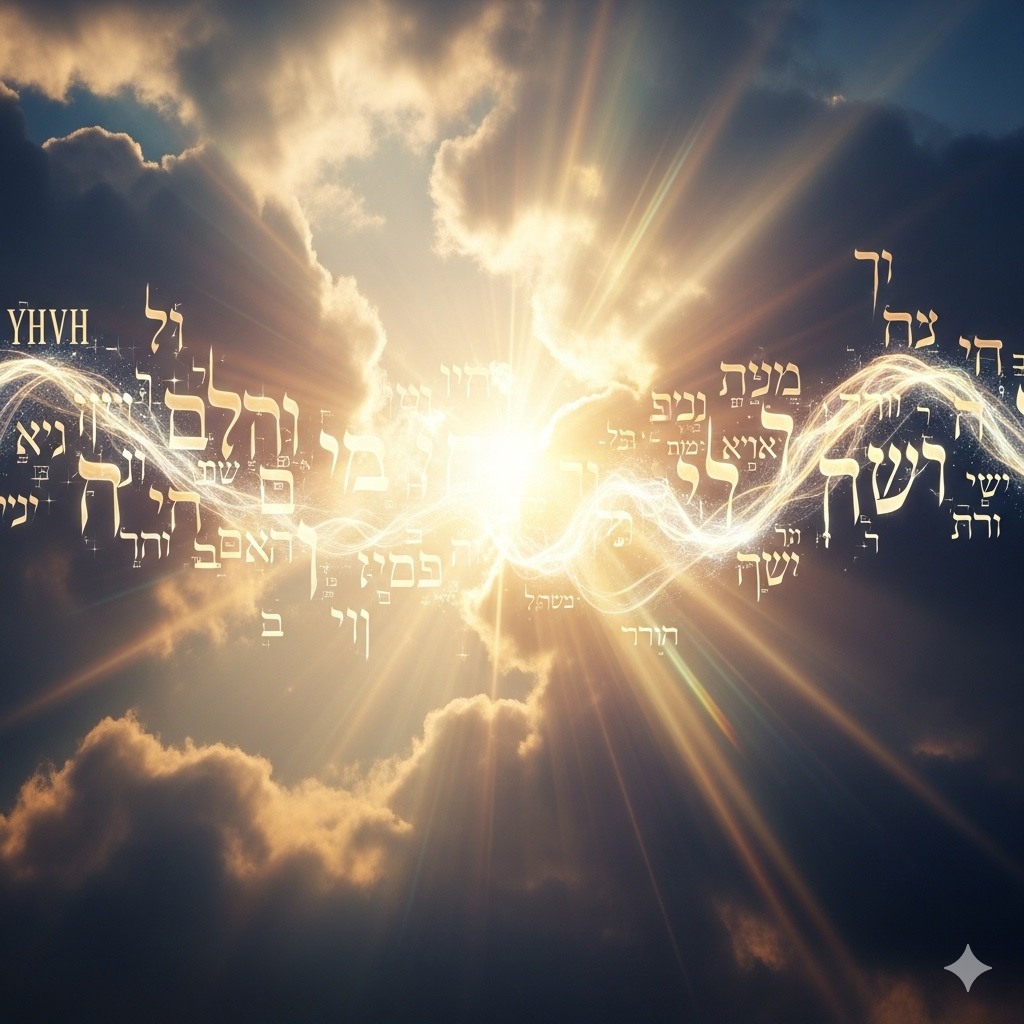أسماء الله المختلفة ومعانيها؟
نقلا عن موقع GotQuestions.org/
30 آب/2025
What are the different names of God, and what do they mean?
GotQuestions.org/August 30/2025
Answer: Each of the many names of God describes a different aspect of His many-faceted character. Here are some of the better-known names of God in the Bible:
EL, ELOAH [el, el-oh-ah]: God “mighty, strong, prominent” (Nehemiah 9:17; Psalm 139:19) – etymologically, El appears to mean “power” and “might” (Genesis 31:29). El is associated with other qualities, such as integrity (Numbers 23:19), jealousy (Deuteronomy 5:9), and compassion (Nehemiah 9:31), but the root idea of “might” remains.
ELOHIM [el-oh-heem]: God “Creator, Mighty and Strong” (Genesis 17:7; Jeremiah 31:33) – the plural form of Eloah. Being plural, Elohim accommodates the doctrine of the Trinity. From the Bible’s first sentence, the superlative nature of God’s power is evident as God (Elohim) speaks the world into existence (Genesis 1:1).
EL SHADDAI [el-shah-dahy]: “God Almighty,” “The Mighty One of Jacob” (Genesis 17:1; Exodus 6:3; Ruth 1:20) – speaks to God’s ultimate power over all.
ADONAI [ˌædɒˈnaɪ; ah-daw-nahy]: “Lord” or “Master” (Genesis 15:2; Judges 6:15) — emphasizes God’s authoritative relationship with humanity and our need to submit in reverence to God. Adonai was often used in place of YHWH, which was thought by the Jews to be too sacred to be uttered by sinful men.
YHWH / YAHWEH / JEHOVAH [yah-way / ji-hoh-veh]: “LORD” (Exodus 3:15; Deuteronomy 6:4; Daniel 9:14) – strictly speaking, the only proper name for God. Translated in English Bibles “LORD” (all capitals) to distinguish it from Adonai, “Lord.” The revelation of the name is given to Moses “I AM WHO I AM” (Exodus 3:14). This name specifies an immediacy, a presence. Yahweh is present, accessible, near to those who call on Him for deliverance (Psalm 107:13), forgiveness (Psalm 25:11) and guidance (Psalm 31:13).
YAHWEH-JIREH [yah-way-ji-reh]: “The Lord Will Provide” (Genesis 22:14) – the name memorialized by Abraham when God provided the ram to be sacrificed in place of Isaac.
YAHWEH-RAPHA [yah-way-raw-faw]: “The Lord Who Heals” (Exodus 15:26) – “I am the Lord who heals you” both in body and soul. In body, by preserving from and curing diseases, and in soul, by pardoning iniquities.
YAHWEH-NISSI [yah-way-nee-see]: “The Lord Our Banner” (Exodus 17:15), where banner is understood to be a rallying place. This name commemorates the desert victory over the Amalekites in Exodus 17.
YAHWEH-M’KADDESH [yah-way-meh-kad-esh]: “The Lord Who Sanctifies, Makes Holy” (Leviticus 20:8; Ezekiel 37:28) – God makes it clear that He alone, not the law, can cleanse His people and make them holy.
YAHWEH-SHALOM [yah-way-shah-lohm]: “The Lord Our Peace” (Judges 6:24) – the name given by Gideon to the altar he built after the Angel of the Lord assured him he would not die as he thought he would after seeing Him.
YAHWEH-ELOHIM [yah-way-el-oh-him]: “LORD God” (Genesis 2:4; Psalm 59:5) – a combination of God’s unique name YHWH and the generic word for “God” signifying that He is the Lord who is God.
YAHWEH-TSIDKENU [yah-way-tzid-kay-noo]: “The Lord Our Righteousness” (Jeremiah 33:16) – As with YHWH-M’Kaddesh, it is God alone who provides righteousness (from the Hebrew word tsidkenu) to man, ultimately in the person of His Son, Jesus Christ, who became sin for us “that in him we might become the righteousness of God” (2 Corinthians 5:21).
YAHWEH-ROHI [yah-way-roh-hee]: “The Lord Our Shepherd” (Psalm 23:1) – David knew what it was to be a shepherd to his sheep, and he declared, “The Lord is my shepherd [Yahweh-Rohi]; I shall not want” (Psalm 23:1, ESV).
YAHWEH-SHAMMAH [yah-way-sham-mahw]: “The Lord Is There” (Ezekiel 48:35) – the name ascribed to Jerusalem and the temple there, indicating that the once-departed glory of the Lord (Ezekiel 8—11) had returned (Ezekiel 44:1–4).
YAHWEH-SABAOTH [yah-way-sah-bah-ohth]: “The Lord of Hosts” (Isaiah 1:24; Psalm 46:7) – Hosts means “hordes,” both of angels and of men. He is Lord of the host of heaven and of the inhabitants of the earth, of Jews and Gentiles, of rich and poor, master and slave. The name is expressive of the majesty, power, and authority of God and shows that He is able to accomplish what He determines to do.
EL ELYON [el-el-yohn]: “Most High” (Genesis 14:18–22; Deuteronomy 32:8; Psalm 7:17; 57:2; 97:9) – derived from the Hebrew root for “go up” or “ascend,” so the implication is of that which is the very highest. El Elyon denotes exaltation and speaks of absolute right to lordship.
EL ROI [el-roh-ee]: “God of Seeing” (Genesis 16:13) – the name ascribed to God by Hagar, alone and desperate in the wilderness after being driven out by Sarah (Genesis 16:1–14). When Hagar met the Angel of the Lord, she realized she had seen God Himself in a theophany. She also realized that El Roi saw her in her distress and testified that He is a God who lives and sees all.
EL-OLAM [el-oh-lahm]: “Everlasting God” (Psalm 90:1-3) – God’s nature is without beginning or end, free from all constraints of time, and He contains within Himself the very cause of time itself. “From everlasting to everlasting you are God” (Psalm 90:2).
EL-GIBHOR [el-ghee-bohr]: “Mighty God” (Isaiah 9:6) – the name describing the Messiah, Christ Jesus, in this prophetic portion of Isaiah. As a powerful and mighty warrior, the Messiah, the Mighty God, will accomplish the destruction of God’s enemies and rule with a rod of iron (Revelation 19:15).
أسماء الله المختلفة ومعانيها؟
نقلا عن موقع GotQuestions.org/
30 آب/2025
كل اسم من أسماء الله الكثيرة يصف جانبًا مختلفًا من صفاته المتعددة. إليك بعض من أشهر أسماء الله الواردة في الكتاب المقدس:
إيل، إلوه [el, el-oh-ah]: كلمة تعني “الله” أو “القدير، القوي، البارز” (نحميا 9: 17؛ مزمور 139: 19). من الناحية اللغوية، يبدو أن إيل تعني “قوة” و”عظمة” (تكوين 31: 29). ويرتبط اسم إيل بصفات أخرى مثل النزاهة (عدد 23: 19)، والغيرة (تثنية 5: 9)، والرحمة (نحميا 9: 31)، ولكن الفكرة الأساسية لـ “القوة” تبقى هي الجذر.
إلوهيم [el-oh-heem]: كلمة تعني “الله”، “الخالق، القدير والقوي” (تكوين 17: 7؛ إرميا 31: 33) وهي صيغة الجمع من “إلوه”. كونها صيغة جمع، فإن “إلوهيم” تتفق مع عقيدة الثالوث. فمنذ الجملة الأولى في الكتاب المقدس، يتجلى الطابع الأسمى لقوة الله عندما يتكلم الله (إلوهيم) فيوجد العالم (تكوين 1: 1).
إيل شداي [el-shah-dahy]: “الله القدير”، “قدير يعقوب” (تكوين 17: 1؛ خروج 6: 3؛ راعوث 1: 20) — يتحدث عن قوة الله المطلقة على كل شيء.
أدوناي [ˌædɒˈnaɪ; ah-daw-nahy]: “الرب” أو “السيد” (تكوين 15: 2؛ قضاة 6: 15) — يؤكد على علاقة الله السلطوية بالبشر وحاجتنا للخضوع بوقار لله. كان اسم “أدوناي” يُستخدم غالبًا بدلاً من “يهوه”، الذي كان اليهود يعتبرونه أقدس من أن ينطق به البشر الخطاة.
يهوه / يهوه / يهوفا [yah-way / ji-hoh-veh]: “الرَّبُّ” (خروج 3: 15؛ تثنية 6: 4؛ دانيال 9: 14) — هو الاسم الوحيد الصحيح لله. يُترجم في التراجم الإنجليزية بكلمة “LORD” (بأحرف كبيرة بالكامل) لتمييزه عن “أدوناي” التي تعني “الرب”. وقد أُعلن هذا الاسم لموسى عندما قال الله: “أَهْيَه الَّذِي أَهْيَه” (خروج 3: 14). يشير هذا الاسم إلى حضور فوري وقرب الله. فيهوه حاضر وقريب لمن يدعوه طالبًا النجاة (مزمور 107: 13)، والمغفرة (مزمور 25: 11)، والإرشاد (مزمور 31: 13).
يهوه يِرَأَه [yah-way-ji-reh]: “الرب يدبر” (تكوين 22: 14) — هو الاسم الذي خلّده إبراهيم عندما دبر الله الكبش ليُضحى به بدلًا من إسحاق.
يهوه رَافَا [yah-way-raw-faw]: “الرب الشافي” (خروج 15: 26) — “أَنَا الرَّبُّ شَافِيكَ” جسدًا ونفسًا. جسدًا، بالحفظ من الأمراض والشفاء منها، ونفسًا، بغفران الآثام.
يهوه نِسِّي [yah-way-nee-see]: “الرب رايتنا” (خروج 17: 15)، حيث تُفهم الراية على أنها مكان للتجمع. هذا الاسم يخلد الانتصار على العمالقة في البرية، المذكور في خروج 17.
يهوه مِقَدِّش [yah-way-meh-kad-esh]: “الرب الذي يقدس” (لاويين 20: 8؛ حزقيال 37: 28) — يوضح الله أنه هو وحده، وليس الناموس، الذي يمكنه أن يطهر شعبه ويقدسه.
يهوه شَالُوم [yah-way-shah-lohm]: “الرب سلامنا” (قضاة 6: 24) — الاسم الذي أطلقه جدعون على المذبح الذي بناه بعد أن أكد له ملاك الرب أنه لن يموت، كما كان يظن بعد رؤيته.
يهوه إلوهيم [yah-way-el-oh-him]: “الرب الإله” (تكوين 2: 4؛ مزمور 59: 5) — هو مزيج من اسم الله الفريد “يهوه” والكلمة العامة “إلوهيم” التي تعني “إله”، مما يدل على أنه الرب الذي هو الإله.
يهوه صِدْقِينُو [yah-way-tzid-kay-noo]: “الرب برنا” (إرميا 33: 16) — كما هو الحال مع “يهوه مِقَدِّش”، الله وحده هو الذي يمنح البر (من الكلمة العبرية “صِدْقِينُو”) للإنسان، وفي النهاية من خلال شخص ابنه، يسوع المسيح، الذي صار خطية لأجلنا “لِكَيْ نَصِيرَ نَحْنُ بِرَّ اللهِ فِيهِ” (2 كورنثوس 5: 21).
يهوه رُوعِي [yah-way-roh-hee]: “الرب راعيّ” (مزمور 23: 1) — عرف داود ما يعنيه أن يكون راعيًا لغنمه، وأعلن: “الرَّبُّ رَاعِيَّ [يهوه رُوعِي] فَلاَ يُعْوِزُنِي شَيْءٌ” (مزمور 23: 1).
يهوه شَمَّه [yah-way-sham-mahw]: “الرب هناك” (حزقيال 48: 35) — الاسم المنسوب لأورشليم والهيكل فيها، مما يشير إلى أن مجد الرب الذي كان قد غادر (حزقيال 8-11) قد عاد (حزقيال 44: 1-4).
يهوه صَبَأُوت [yah-way-sah-bah-ohth]: “رب الجنود” (إشعياء 1: 24؛ مزمور 46: 7) — كلمة “جنود” تعني “حشود”، سواء من الملائكة أو البشر. إنه رب جنود السماء وسكان الأرض، ورب اليهود والأمم، والأغنياء والفقراء، والسادة والعبيد. يعبر هذا الاسم عن جلال الله وقوته وسلطانه، ويوضح أنه قادر على إتمام ما يقرره.
إيل عَلِيُون [el-el-yohn]: “العليّ” (تكوين 14: 18-22؛ تثنية 32: 8؛ مزمور 7: 17؛ 57: 2؛ 97: 9) — مشتق من الجذر العبري الذي يعني “يصعد” أو “يرتقي”، لذا فإن المعنى هو “الأعلى على الإطلاق”. يشير “إيل عليون” إلى الرفعة ويتحدث عن الحق المطلق لله في السيادة.
إيل رُوعِي [el-roh-ee]: “إله الرؤية” (تكوين 16: 13) — الاسم الذي أطلقته هاجر على الله، وهي وحيدة ويائسة في البرية بعد أن طردتها سارة (تكوين 16: 1-14). عندما التقت هاجر بملاك الرب، أدركت أنها قد رأت الله نفسه في ظهور إلهي. كما أدركت أن “إيل رُوعِي” قد رآها في ضيقتها وشهدت أنه إله حي يرى كل شيء.
إيل عُولَام [el-oh-lahm]: “الإله الأبدي” (مزمور 90: 1-3) — طبيعة الله لا بداية لها ولا نهاية، وهو متحرر من كل قيود الزمن، ويحتوي في ذاته على سبب وجود الزمن نفسه. “مِنَ الأَزَلِ إِلَى الأَبَدِ أَنْتَ اللهُ” (مزمور 90: 2).
إيل جِبُّور [el-ghee-bohr]: “الإله القدير” (إشعياء 9: 6) — الاسم الذي يصف المسيح، يسوع، في هذا الجزء النبوي من سفر إشعياء. فكمحارب قدير وجبار، سيقوم المسيح، الإله القدير، بتحقيق دمار أعداء الله وسيحكم بقضيب من حديد (رؤيا 19: 15).


















